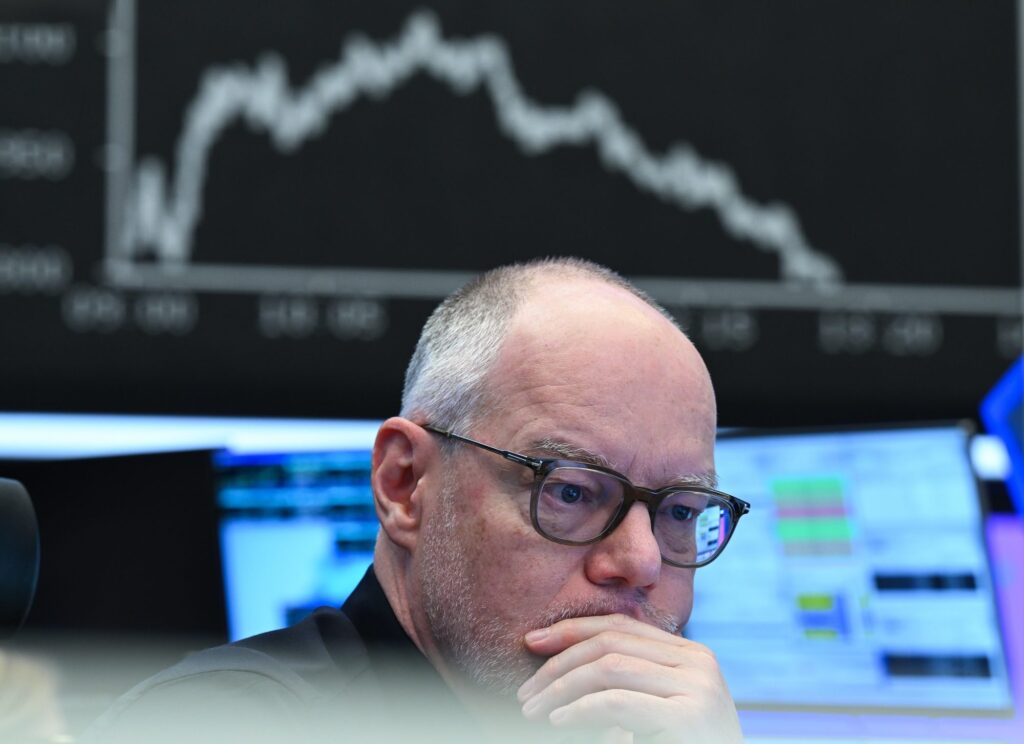Trump’s “Liberation Day” triggered a selloff in risk assets and sent shockwaves through corporate boardrooms worldwide.
The newly instated US tariffs, which come into effect from April 5, will pummel export industries in Europe and Asia and precipitate adverse outcomes in global economic growth, consumer price inflation, cross-border capital flows and emerging market sovereign debt stress metrics.
In the Gulf, the reverberations are considerable. The region supplies 16 percent of US aluminium imports, a trade flow now under strain from the new tariffs.
But the bigger threat is indirect – through global oil markets and the cost of sovereign borrowing. Brent crude dropped nearly 6 percent on Liberation Day, pricing in fears of dampened demand as global supply chains brace for disruption.
The purchasing power of the Gulf states declines as the US dollar depreciates. Tariff-driven rises in imports from Asia and Europe will also exacerbate GCC inflation.
A rise in regional inflation rates will increase the fiscal pressure on government revenues due to lower oil prices.
Deloitte estimates that GCC sovereign wealth funds have invested $12 trillion in assets worldwide. Liberation Day thus means that the six Gulf states have been “liberated” from almost a trillion dollars in overseas wealth since Tariff Man moved into the Oval Office. Sad, but true.
Volatility at home and abroad
Trump’s trade war escalation, coupled with mass deportation of illegal immigrants and the US’s indiscriminate slashing of government payrolls, only adds to the malign White House policy mix for Wall Street and the US economy.
In 2018, Trump increased tariffs on China and the EU after corporate America was gifted a tax cut and a pivot to deregulation.
In 2025, an aggressive trade war has preceded a tax cut or any serious deregulation initiative. The US stock market peaked a month after Trump’s inauguration but is now 10 percent below its February 19 high.
The S&P 500’s Volatility Index (VIX), Wall Street’s pendulum of greed and fear, has risen to 26, which is 52 percent above its New Year level of 17.
Ironically, Trump’s first two months have sparked $5 trillion in wealth destruction in the US stock market alone and the odds of a recession have risen from 15 percent to 50 percent.
The latest tariff salvo is certain to increase core consumer price index (CPI) and thus the cost of living for untold millions of low to middle-income US consumers who are dependent on low-priced Chinese goods.
Their prices will surge now that Trump has slapped a 54 percent tariff on exports from the Dragon Empire.
The Federal Reserve faces an acute dilemma. It cannot respond with rate cuts
The Atlanta Fed GDPNow, a real-time GDP forecaster, estimated that the US economy contracted by an annualised 2.8 percent in Q1 2025.
The problem is that the Federal Reserve faces an acute dilemma. It cannot respond with rate cuts when core CPI is expected to rise to 3.5 percent, far above its 2 percent price stability dual mandate target.
The plunge in the 10-year US Treasury note yield from 4.8 percent in January to 4.05 percent is an ominous testament to the fact that Wall Street now expects US economic growth to decelerate sharply while Trump’s tariffs cause an inflation spike.
The macro endgame is thus stagflation, which proved ruinous to financial assets in the late 1970s.
The golden age of merger mania and IPO windfalls anticipated by financiers when Trump won the election last November has simply not materialised – proving the adage true: “Be careful what you wish for; you just might get it.”
The fall in the US dollar index from 110 in January to 103 now compounds the economic pain of higher tariffs for export-oriented economies, such as Japan, South Korea, Germany, Taiwan and Vietnam.
The sustained rise in gold prices – from $1,800 an ounce following the Federal Reserve’s draconian rate hikes in late 2022 to $3,100 today – highlights the fact that global central banks are increasingly replacing the US dollar with gold as the de facto reserve currency.
This pivot reflects the erosion of trust in the greenback, accelerated by successive American administrations’ weaponisation of the dollar and the offshore funding markets. The US Treasury’s 2022 seizure of the Russian Central Bank’s assets dealt a severe blow to the dollar’s credibility as a reserve asset.
Trump’s tariffs will accelerate foreign central bank safe-haven flows into gold and the Japanese yen. The British pound also benefits on Planet Forex as the UK Plc, despite myriad domestic woes, is not in the crosshairs of Trump’s trade bazooka.
US-EU economic relations will inevitably deteriorate if Brussels hits back with retaliatory sanctions as Ursula von der Leyen, the EU Commission president, has promised. The $2 trillion bilateral trade between the US and EU is the umbilical cord of world trade.
The Cold War between Beijing and Washington will only escalate geopolitical tensions and affect FDI inflow into the US economy at a time when uncertainty risks freezing domestic capex.
Matein Khalid is an investor in global financial markets and board adviser to leading family offices in the UAE and Saudi Arabia
Register now: It’s easy and free
AGBI registered members can access even more of our unique analysis and perspective on business and economics in the Middle East.
Why sign uP
Exclusive weekly email from our editor-in-chief
Personalised weekly emails for your preferred industry sectors
Read and download our insight packed white papers
Access to our mobile app
Prioritised access to live events
Already registered? Sign in
I’ll register later



